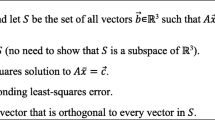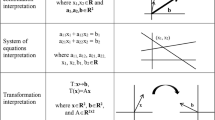Abstract
In any procedural mathematical situation, there are multiple ways of achieving the same answer. Given this observation, we ask, why choose one procedural solution over another? We address this question here with data drawn from interviews conducted with university students engaged in row-reducing matrices. During their tasks, the students voiced a variety of justifications for the procedural steps they enacted. Through a phenomenographical analysis (Marton, Instructional Science, 10, 177–200, 1981) of their utterances, we construct a framework for justifications for choices made within procedures with two broad categories, algorithmic and anticipatory. By comparison, this is similar to the creative/imitative reasoning framework of Lithner (Educational Studies in Mathematics, 67, 255–276, 2008), a framework primarily emerging from less procedural settings. We suggest that, given this richness in justifications brought forth by a procedural setting, when used effectively, instruction in mathematical procedures has the potential to contribute to deeper, more flexible forms of mathematical knowledge overall.

Similar content being viewed by others
References
Boero, P. (2001). Transformation and anticipation as key processes in algebraic problem solving. In R. Sutherland, T. Rojano, A. Bell, & R. Lins (Eds.), Perspectives on school algebra (pp. 99–119). Dordrecht: Kluwer.
Dowker, A. (1992). Computational estimation strategies of professional mathematicians. Journal for Research in Mathematics Education, 23, 45–55.
Hardy, G. H. (1940). A mathematician’s apology. Cambridge: Cambridge University Press.
Hiebert, J., & Lefevre, P. (1986). Conceptual and procedural knowledge in mathematics: an introductory analysis. In J. Hiebert (Ed.), Conceptual and procedural knowledge: The case of mathematics (pp. 1–27). Hillsdale: Lawrence Erlbaum Associates.
Lithner, J. (2000). Mathematical reasoning and familiar procedures. International Journal of Mathematical Education in Science and Technology, 31, 83–95.
Lithner, J. (2003). Students mathematical reasoning in university textbook exercises. Educational Studies in Mathematics, 52, 29–55.
Lithner, J. (2008). A research framework for creative and imitative reasoning. Educational Studies in Mathematics, 67, 255–276.
Maciejewski, W., & Merchant, S. (2015). Mathematical tasks, study approaches, and course grades in undergraduate mathematics: a year-by-year analysis. International Journal of Mathematical Education in Science and Technology, 47(3), 373–387.
Maciejewski, W., & Star, J. (2016). Developing flexible procedural knowledge in undergraduate calculus. Research in Mathematics Education, 18(3), 299–316.
Marton, F. (1981). Phenomenography—describing conceptions of the world around us. Instructional Science, 10, 177–200.
NCTM (2014). Procedural fluency in mathematics: a position of the National Council of Teachers of Mathematics. Retrieved from https://www.nctm.org/Standards-and-Positions/Position-Statements/Procedural-Fluency-in-Mathematics/.
Newton, K., Star, J., & Lynch, K. (2010). Understanding the development of flexibility in struggling algebra students. Mathematical Thinking & Learning, 12, 282–305.
Pesek, D. D., & Kirschner, D. (2000). Interference of instrumental instruction in subsequent relational learning. Journal for Research in Mathematics Education, 31, 524–540.
Rittle-Johnson, B., & Koedinger, K. (2009). Iterating between lessons on concepts and procedures can improve mathematics knowledge. British Journal of Educational Psychology, 79(3), 483–500.
Rittle-Johnson, B., Schneider, M., & Star, J. R. (2015). Not a one-way street: bidirectional relations between procedural and conceptual knowledge of mathematics. Educational Psychology Review, 27, 587–597.
Rittle-Johnson, B., & Star, J. R. (2007). Does comparing solution methods facilitate conceptual and procedural knowledge? An experimental study on learning to solve equations. Journal of Educational Psychology, 99, 561–574.
Rittle-Johnson, B., & Star, J. R. (2009). Compared with what? The effects of different comparisons on conceptual knowledge and procedural flexibility for equation solving. Journal of Educational Psychology, 101(3), 529–544.
Schneider, M., Rittle-Johnson, B., & Star, J. R. (2011). Relations between conceptual knowledge, procedural knowledge, and procedural flexibility in two samples differing in prior knowledge. Developmental Psychology, 47, 1525–1538. https://doi.org/10.1037/a0024997
Schoenfeld, A. (1985). Mathematical problem solving. New York: Academic Press.
Sfard, A. (1991). On the dual nature of mathematical conceptions: reflections on processes and objects as two sides of the same coin. Educational Studies in Mathematics, 22, 1–36.
Sidenvall, J., Lithner, J., & Jäder, J. (2015). Students’ reasoning in mathematics textbook task-solving. International Journal of Mathematics Education in Science and Technology, 46, 533–552.
Skemp, R. (1976). Relational understanding and instrumental understanding. Mathematics Teaching, 77, 20–26.
Star, J. R. (2005). Reconceptualizing procedural knowledge. Journal for Research in Mathematics Education, 36(5), 404–411.
Star, J. R. (2007). Foregrounding procedural knowledge. Journal for Research in Mathematics Education, 38(2), 132–135.
Star, J. R., & Newton, K. J. (2009). The nature and development of experts’ strategy flexibility for solving equations. ZDM Mathematics Education, 41, 557–567.
Star, J. R., & Rittle-Johnson, B. (2008). Flexibility in problem solving: the case of equation solving. Learning and Instruction, 18, 565–579.
Star, J. R., & Seifert, C. (2006). The development of flexibility in equation solving. Contemporary Educational Psychology, 31, 280–300.
Stigler, J. W. (1999). The teaching gap : best ideas from the world’s teachers for improving education in the classroom. New York: Free Press.
Tallman, M., Carlson, M. P., Bressoud, D. M., & Pearson, M. (2016). A characterization of calculus 1 final exams in U.S. colleges and universities. International Journal of Research in Undergraduate Mathematics Education, 2, 105–133.
Verschaffel, L., Luwel, K., Torbeyns, J., & Van Dooren, W. (2009). Conceptualizing, investigating, and enhancing adaptive expertise in elementary mathematics education. European Journal of Psychology of Education, 24, 335–359.
Verschaffel, L., Torbeyns, J., De Smedt, B., Luwel, K., & Van Dooren, W. (2007). Strategy flexibility in children with low achievement in mathematics. Educational & Child Psychology, 24(2), 16–27.
Weber, K., & Mejia-Ramos, P. (2015). On relative and absolute conviction in mathematics. For the Learning of Mathematics, 35, 15–21.
Xu, L., Liu, R., Star, J., Wang, J., Liu, Y., & Zhen, R. (2017). Measures of potential flexibility and practical flexibility in equation solving. Frontiers in Psychology, 8, 1368. https://doi.org/10.3389/fpsyg.2017.01368
Author information
Authors and Affiliations
Corresponding author
Additional information
Publisher’s note
Springer Nature remains neutral with regard to jurisdictional claims in published maps and institutional affiliations.
Rights and permissions
About this article
Cite this article
Maciejewski, W., Star, J.R. Justifications for choices made in procedures. Educ Stud Math 101, 325–340 (2019). https://doi.org/10.1007/s10649-019-09886-7
Published:
Issue Date:
DOI: https://doi.org/10.1007/s10649-019-09886-7




